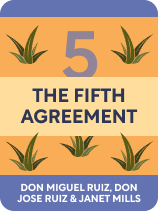

This article is an excerpt from the Shortform book guide to "The Fifth Agreement" by Don Miguel Ruiz. Shortform has the world's best summaries and analyses of books you should be reading.
Like this article? Sign up for a free trial here .
Do you practice healthy skepticism? What’s the difference between skepticism and cynicism?
Healthy skepticism is a handy tool to have around if you want to get at the truth. It’s also a way to achieve freedom of control, according to The Fifth Agreement authors don Miguel Ruiz and don Jose Ruiz. This is your ticket to choosing how you want to live.
Read more to learn how to leverage healthy skepticism, and how skepticism is different from cynicism.
Exercising Healthy Skepticism
Once you arrive at the fifth step, you’ve done the hard work of reframing your beliefs and adjusting your worldview in a way that better serves your health and happiness. Now, you’re ready to move to the third stage of Toltec enlightenment—the freedom of control. In other words, since you’re no longer being controlled by beliefs you didn’t choose, it’s up to you to decide how to live. You have the freedom to choose the shape and tone of your subjective reality.
How do we make the most of this freedom? The naguals recommend avoiding:
- Blindly accepting new beliefs
- Making new assumptions
- Taking messages at face value
To maintain total freedom, the naguals say, doubt and question everything you hear. In other words, practice healthy skepticism. No matter how well you manage your environment, you’ll still live in a shared world. As such, you’ll often see upsetting or manipulative messages—your culture and society, for example, will still attempt to tell you what to believe, how to feel, and who to be. Social media will still blast you with emotional content. If you blindly take these things at face value, the naguals warn, assuming they’re true, valid, and “real,” you risk being dragged back into the mirage.
(Shortform note: The “doubt” the naguals are promoting is what’s often called “healthy skepticism.” It’s important to note that a skeptic is different from a cynic: While a cynical person leverages doubt to avoid adjusting their worldview, doubting evidence that contradicts their beliefs, a skeptic holds off on making adjustments until they’ve gathered sufficient evidence to determine what’s really true.)
Instead, the naguals recommend you use doubt as a tool to detach yourself from your knee-jerk, automatic response to incoming messages. If you don’t immediately accept an upsetting message as fact, its impact is dulled and slowed, and you have time to think about it before it becomes part of your subjective reality. That ability to detach and delay, emotionally and intellectually, allows you to control what you believe, feel, and think, as well as how you behave, regardless of what’s happening around you. It’s how you maintain the freedom of control.
(Shortform note: Part of doubting what you hear is holding off on deciding whether it’s true or not—or whether you believe or agree with it. In short, you’ll need to embrace uncertainty, which psychologists argue is a healthy practice. Doing so is critical to becoming emotionally stable, and it builds resilience—the ability to adapt to change. That’s part of what the naguals want for you: To be able to face the uncertainty of your social and personal future with bravery and hope.)
Doubt Peoples’ Messages, but Respect Their Perspectives
It’s particularly important, the naguals note, to apply this principle to our interactions with other people. Respect the perspectives of others but doubt the messages they send. Allow others to express their perspective without judging or influencing them—but don’t blindly accept their expressed perspective as truth.
What others say is often a surface-level attempt to convey their true message—if we believe it, we risk accepting a falsehood or an obfuscation of the truth. Look past the subjective words they’re using to describe their reality and see what they’re really trying to communicate.
For example, “you’re lazy” might really mean, “I’m worried about you because you’re staying in bed a lot,” or, “I wish I could be as relaxed as you look,” or, simply, “I don’t like you.” You won’t see the true message unless you doubt the words, and if you’re caught up in the emotional turmoil of reacting to “you’re lazy,” you won’t have the bandwidth to see clearly.
(Shortform note: The naguals don’t explain why people don’t just say what they mean, but it’s usually because they’re afraid to. It’s not always safe, acceptable, or wise to say exactly what we’re thinking or feeling, and it can be difficult to tell when it is and isn’t okay to be straightforward. Further, it’s risky to be open because doing so leaves us vulnerable to judgment and attack. As such, be compassionate: Most people aren’t “lying” to be malicious.)
| How—and Why—to Respectfully Hear Stories You Doubt There’s another practical application for the naguals’ “doubt, but respect” philosophy: learning from others. To learn from others, you must give them a safe space in which to express themselves—that’s what the naguals mean by “respect.” Conflicts and disagreements are opportunities to develop mutual understanding and build common ground—they are not wars you need to win. You may disagree with the story another person tells—that is, you may doubt their words—but when you respond with hostility, try to shut them down, or tunnel in on “winning” the “argument,” you’re not respecting their story. Instead, in shutting them out or attacking them, you throw away the opportunity to learn, connect, teach, and even coexist. In short, that kind of behavior won’t lead you toward peace, freedom, or acceptance. Instead of reacting strongly when you find a point of disagreement, don’t defend or attack; get curious: Be willing to explain your perspective, but—more importantly—to hear theirs. Listen to the actual substance—the message—not just the headline of what they’re saying. Ask them to elaborate: “What makes you say that?” “What makes you feel that way?” Take note of areas where you do agree with each other, and remember you’re disagreeing with the perspective, not the existence of the person. Frame your sentences as “I” statements, not “you” statements: “I’m finding it almost impossible to save money while paying my student loans,” not, “You boomers ruined the economy, and now I’ll never be able to afford a house!” Stay open to the possibility that your perspective is flawed; you may not be right about everything you believe, and this might be the person who opens your eyes to something. Give them a chance to show you they’re struggling, too. Finally, remember that having the conversation is a win. You don’t have to agree—it’s enough if even one of you got to see something you were blind to. Like the naguals note, in the end, we get to choose what we believe—and so does everyone else. Don’t waste your energy trying to force a belief on someone else, and don’t feel obligated to accept a belief you don’t feel is right for you. Step 5 is about developing the ability to listen without hurting others or being hurt yourself—that’s a strength that will serve you well. |
Healthy skepticism is a handy tool to use when you want to discern the truth and achieve freedom of control in your life.

———End of Preview———
Like what you just read? Read the rest of the world's best book summary and analysis of Don Miguel Ruiz's "The Fifth Agreement" at Shortform .
Here's what you'll find in our full The Fifth Agreement summary :
- The five “agreements” to make with yourself that adjust your outlook
- How to rediscover your true self and recapture the freedom you felt as a child
- A five-step process to escape the mirage of “the real world”






